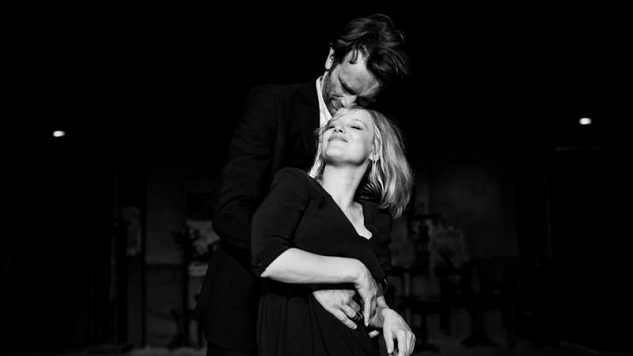Cold War

Consideration of the past often invites opportunities for heartache, especially when the past being considered is one’s own. Polish director Pawel Pawlikowski’s new movie, Cold War, gets especially personal, building a bittersweet romance over the course of the 1950s, a love that first ignites, then smolders, between two people as their lives intersect through the decade. Wiktor (Tomasz Kot) is a musical director touring rural Poland, and young singer Zula (Joanna Kulig), an ambitious enigma posing as a village girl. Her voice bewitches everyone in earshot, Wiktor most of all, and he is captivated by her talent and beauty.
Wiktor is Pawlikowski’s father, Zula his mother, or at least versions of them. Cold War doesn’t trace the precise steps Mom and Dad took through the title period—the discontent felt between Russia, its foreign allies and its neighboring states, the resultant tension and turmoil that permeated Europe—but he dedicates the film in their memory nonetheless. This is Pawlikowski’s monument to his parents and to an era. In the camera’s eye, guided by cinematographer Lukasz Zal (collaborating with Pawlikowski anew after 2014’s Ida), time and heritage are inextricably linked to each other. Ennui and the search for reprieve from oppressive institutions weigh down the 1950s, interrupted on brief occasion by bursts of joy expressed through dance, music, culture writ large, and lovemaking.
All of the things that make life worth living, in other words. Wiktor and Zula aren’t alone in their pursuit of better days: Everyone, whether fleshed out or left to mingle in the movie’s margins, is seeking more for themselves. “No more will the talents of the People go to waste. Hurrah!” proclaims party official, xenophobe and unabashed nationalist Kaczmarek (Borys Szyc), addressing a crowd of country folk gathered to audition for the Mazurek ensemble, a troupe established by the state to champion Polish folk music and dancing. Zal hangs the lens over their heads. Kaczmarek’s words float above like a prayer. The effect is taunting, a speech to rouse and inspire its audience that elides a painful reality—most of them won’t make the cut.
Enter Zula, pulling a fast one on Wiktor and most of his cohorts: Zula isn’t from the mountains at all. She’s just smart enough to gull mountain lasses into giving away their traditional songs so she can claim them for herself. What’s more, she may or may not have killed her own dad at home and called the cleaning lady before she called the coroner. Fact or fiction, Zula charms Wiktor, and he installs her as the crown jewel of the Mazurek. They can’t keep their hands off one another, both staring across rooms and crowds to find each other’s eyes, tumbling into amour that’s written in the stars.
-

-

-

-

-

-

-

-

-

-

-

-

-

-

-

-

-

-

-

-

-

-

-

-

-

-

-

-

-

-

-

-

-

-

-

-

-

-

-

-








































